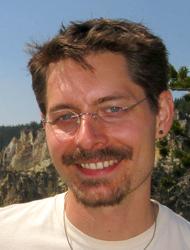Kaleb C. Lund
PhD, RH (AHG)
Kaleb is core faculty in the School of Naturopathic Medicine and chair of the Department of Botanical Medicine at Bastyr University.
Dr. Lund has a strong background in chemistry and toxicology and applies these sciences to his current passion - botanical medicine. His interests lie in the chemical and ecological relationships that form the foundation of plant medicine and draws on these relationships when working with plants in the laboratory, the classroom, or when using them to heal.
After joining Bastyr University as a postdoc fellow in 2007, Dr. Lund began training in herbal medicine and natural products research. Since that time, he has served as the Director of Research Laboratories, has been credentialed as a registered herbalist by the American Herbalists Guild, and now serves as core faculty in the Department of Botanical Medicine where he trains students in pharmacognosy, materia medica, regulation of dietary supplements, and natural products research.
Dr. Lund is currently teaching classes through the departments of Botanical Medicine and Basic Sciences. His focus is on botanical research, phytochemistry/pharmacy, and dietary supplement quality and regulations. His research interests include developing models to improve the validity of in vitro assessment of botanical medicines including simulated digestion and hepatic metabolism as well as analytical methods that account for the complexity of whole herbal products. Dr. Lund continues to mentor graduate and undergraduate students in a multitude of exciting and creative research projects developed by students in the herbal science and nutrition programs.
Dr. Lund’s graduate research focused on mitochondrial toxicity of pharmaceuticals — studying the effects of anti-HIV nucleoside reverse transcriptase inhibitors (NRTIs) on mitochondrial respiration, gene expression, and energy signaling.
As a postdoctoral fellow at the Bastyr University Research Institute (BURI), Dr. Lund expanded his research interests to include herbal science research, including the preparation, authentication and assessment of the biological activities of botanical medicines. His postdoctoral research involved the study of how excess glucose leads to mitochondrial dysfunction using in vitro models of hyperglycemia-induced endothelial dysfunction. This research demonstrated that an extract of Japanese dogwood fruit (Cornus officinalis) prevents NF-κB activation and protects mitochondria from hyperpolarization caused by excess glucose.
More recently Dr. Lund served as the Director of Research Laboratories at BURI for three years, managing and maintaining an active, multi-study, natural products research laboratory. He worked to expand the analytical and basic science research capabilities of Bastyr University and strived to keep active projects running smoothly. During this time Dr. Lund mentored 18 undergraduate and graduate student research projects ranging from the immunomodulatory effects of Devil’s Club (Oplopanax horridus) to the discovery of reserpine in Crossvine (Bignonia capreolata). Additionally, using an industry-funded grant, he established a method for modeling in vitro intestinal absorption and applied it to combinations of quercetin, curcumin and resveratrol.
Dr. Lund’s interests include mitochondrial bioenergetics, inflammatory and immune modulation by botanicals, improving the models of in vitro herbal assessment to decrease the use of animal models and the analytical examination of botanicals to demonstrate chemical diversity within species. His dream is to develop methods that account for the complex and emergent pharmacology of botanical medicines.
Dr. Lund is a clinical herbalist and magical philosopher interested in the interaction of the human organism with plants and the natural world at the chemical/physiological, emotional and spiritual levels. He is particularly interested in the process in which plants facilitate healing through biochemistry, emotional connectedness and ultimately through consciousness. Dr. Lund enjoys reading (and putting into practice) classical texts on herbalism and western mystery traditions, especially the integration of astrology and herbal medicine.
Education:
- Postdoctoral training in herbal science at Bastyr University in 2010
- Ph.D. in toxicology from the University of Minnesota in 2007
- MS in chemistry from the University of Minnesota in 2004
- BS in biochemistry from the University of Minnesota in 2000
Professional affiliations
- American Herbalists Guild Professional Member
- Institute of Translational Health Sciences Scholar
Research Interests
Dr. Lund works closely with graduate and undergraduate students to mentor them in various natural products research projects including constituent analysis by HPLC/GC-MS, cell culture, molecular biology, and mitochondrial sensing.
His current projects include: studying the anti-inflammatory mechanisms of Oplopanax horridus (Devil’s Club); modulation of opiate-induced neuroinflammation by Salvia divinorium (Diviner’s Sage) and its potential to treat addiction; and the development of meaningful, in vitro models to research botanical medicines.
Hawthorne, B., Lund, K., Freggiaro, S., Kaga, R., Meng, J. (2022) The mechanism of the cytotoxic effect of Panax notoginseng extracts on prostate cancer cells. Biomedicine & Pharmacotherapy. 149
Lund, K.C., Pantuso, T (2014). “Combination effects of quercetin, resveratrol and curcumin on in vitro intestinal absorption.” Journal of Restorative Medicine. 3: 112-120.
Clark, T., Lund, K.C. (2012). “Presence of the indole alkaloid reserpine in Bignonia capreolata L.” International Journal of Pharmacognosy and Phytochemical Research. 4(3): 89-91
Lund, K.C., K.B. Wallace (2008). “Adenosine 3’,5’-cyclic monophosphate (cAMP)-dependent phosphoregulation of mitochondrial complex I is inhibited by nucleoside reverse transcriptase inhibitors.” Toxicology and Applied Pharmacology 226(1): 94-106
Lund, K.C., L.L. Peterson, and K.B. Wallace (2007). “The absence of a universal mechanism of mitochondrial toxicity with nucleoside analogs.” Antimicrobial Agents and Chemotherapy 51(7): 2531-2539
Lund, K.C. and K.B. Wallace (2004). “Direct effects of nucleoside reverse transcriptase inhibitors on rat cardiac mitochondrial bioenergetics.” Mitochondrion 4: 193-202.
Lund, K.C. and K.B. Wallace (2004). “Direct, DNA pol-γ-independent effects of nucleoside reverse transcriptase inhibitors on mitochondrial bioenergetics.” Cardiovascular Toxicology 4(3): 217-228.
